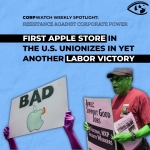Ford Motor Company
This month's winner is Ford Motor Company. Ford placed this advertisement in the May 1996 issue of Popular Science -- a lovely mirage-like image of a silver car in a field of beautiful, pink and red flowers. Puffy, white clouds and majestic, purple mountains form a dreamy backdrop for Ford's new car. The ad is truly eye-catching.
In recent months, the Greenpeace International Toxics Campaign has witnessed a slew of greenwash advertising for earth-friendly automobiles. Common themes of the ads include fuel efficiency, recyclability and safety, and invariably, the ads exhibit a vehicle surrounded by nothing but nature. Gone are props like large-breasted women, scantily clad and suggestively draped over the hoods of gas guzzlers. To sell eco-cars, automobile companies display their goods in wide open spaces, fresh air, and lush vegetation. It's clear that the auto-executives want to capture the attention of an entirely new audience, environmentalists who
feel guilty about their reliance on cars.
This ad for Ford's new synthesis 2010 is impressive greenwash. Ford unabashedly links itself to three environmentally devastating industrial sectors -- automobiles, aluminum and plastics -- and still manages to put an earth-friendly face on its product. In a string of short, choppy phrases, Ford suggests that its highly recyclable, fuel-efficient, aluminum-bodied car maintains all the safety of previous, heavier cars made of steel.
What Ford neglects to predict, however, is how much of the "recyclABLE" material will or can actually be recyCLED. Just saying that something is recyclable does not mean that it is made from recycled material or that it will be recycled at some point in its life. Greenpeace has done extensive research on the plastics recycling industry, for example, and found that the practice is a sham. Much of the plastics collected in western recycling centers ends up in landfills in the Third World. Because recycling plastic usually involves the conversion of used plastic into a totally new product, even if all the plastics were recovered and reprocessed, the need for virgin feedstock in the form of toxic petrochemicals to sustain the industry would remain. This frustrates the most important purpose of recycling -- to reduce demand for raw materials.
Ford also fails to explain the vast environmental devastation of bauxite mines which support the aluminum industry. The stripmining of bauxite probably destroys more of the earth's surface than the mining of any other metal. The production of aluminum requires enormous amounts of energy, and aluminum smelters are an important source of numerous air pollutants including aluminum dust, fluoride dust and gases, hydrocarbons, carbon monoxide, and sulfur dioxide, which contributes significantly to acid rain.
Ford adroitly focuses the prospective customer's attention on subtle design changes, and away from the larger problem of the car itself. Motor vehicle transport is responsible for about one-fifth of all greenhouse gas emissions into the atmosphere. But fuel emissions are only one of the many environmentally
destructive aspects of the automobile society. In the United States alone, almost 1/2 of all urban space is now set aside for automobile use, while some 10% of the arable land has been paved over. Quality of life in cities around the world is declining because of traffic congestion and pollution. And each year,
nearly a half million people die from traffic accidents.
As David C. Korten, author of When Corporations Rule the World said, "Few measures would do more to improve the quality of our living and the health of our environment than organizing living spaces to reduce our dependence on the automobile."
Ford claims that the Synthesis 2010 is a part of the company's effort to build "ENVIRONMENTALLY RESPONSIBLE cars..." But, with the world's growing demand for automobiles (the Worldwatch Institute predicts that within 25 years there may be a billion cars on the road) it is difficult to imagine any automobiles as
"environmentally responsible."
In symbolic recognition of this greenwash advertisement, Ford Motor Company's Chief Executive Officer Alex Trotman will receive a pair of hemp sneakers so he can walk, rather than drive, to work each day.
Check out Ford's Environmental Initiatives - and tell them what you think about their greenwash.
Also be sure to read "Henry Ford was no Oskar Schindler".The Ford Motor Company's commercial-free sponsorship of NBC's airing of Schindler's List, the epic movie about the Holocaust, was a class act. Nevertheless, it would be remiss of us here at CorpWatch, not to point out Ford's contribution to Nazi war efforts.
For further information about automobiles and the environment, check out
the following links:
- Road to Ruin - Friends of the Earth
- NRDC Transportation Links
- Rocky
Mountain Institute - Transportation/Hypercar Center - Union
of Concerned Scientists Transportation Page
Text of Ad
This is the full text of the Ford Motor Company ad published in Popular Science in May 1996:
SEEMS OUR MOST ORIGINAL IDEAS ARE RECYCLED.
Bluer sky, greener grass, cleaner air. These are elements we see in the vehicles we're developing at FORD MOTOR COMPANY. Like the Synthesis 2010. A car whose body is made of 100% RECYCLABLE aluminum. Which is just as strong as steel, yet gentler on the gas pump. Today, Ford is an industry LEADER in aluminum fabrication and RECYCLED plastics. It's all part of our continuing effort to build ENVIRONMENTALLY RESPONSIBLE cars that combine even better fuel economy and HIGH RECYCLABILITY. We believe this visionary thinking, powered by the latest technology, will make cars and trucks safe on the road and on the ENVIRONMENT. Which has always been our original idea.
- 188 Consumerism & Commercialism
- 193 Transportation



